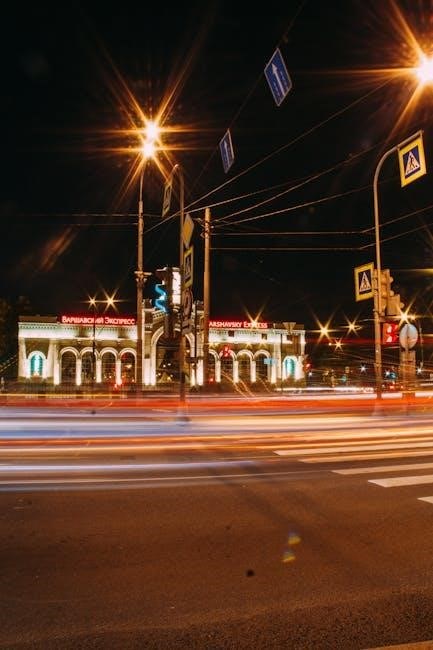A Long Way Gone is a gripping memoir by Ishmael Beah, detailing his harrowing journey as a boy soldier during Sierra Leone’s civil war. The PDF version offers a convenient way to explore this emotional and thought-provoking narrative, highlighting the horrors of war and the resilience of the human spirit.
1.1 Overview of the Book
A Long Way Gone is a memoir by Ishmael Beah, recounting his harrowing experiences as a child soldier during Sierra Leone’s civil war. The book vividly depicts his journey from a carefree childhood to the brutal realities of war, where he was forced to commit atrocities. Beah’s narrative explores themes of loss, survival, and redemption, offering a raw and emotional account of the horrors of conflict. The PDF version of the book is widely available, allowing readers to engage with this powerful story in a convenient digital format;

1.2 Author Ishmael Beah
Ishmael Beah is a Sierra Leonean author and human rights advocate, best known for his memoir A Long Way Gone. Born in 1980, Beah experienced the horrors of civil war firsthand, being conscripted as a child soldier at age 13. After years of rehabilitation, he immigrated to the United States, where he pursued education and writing. Beah’s work sheds light on the plight of child soldiers and the long-term effects of war. His storytelling has earned him international acclaim, and he continues to advocate for children affected by conflict, residing in Brooklyn and working as a UNICEF Goodwill Ambassador.
1.3 Historical Context of Sierra Leone’s Civil War
Sierra Leone’s civil war (1991–2002) was a brutal conflict fueled by political instability, ethnic tensions, and the exploitation of diamond resources. The Revolutionary United Front (RUF), backed by Liberia, sought to overthrow the government, unleashing widespread violence. Civilians faced atrocities, including amputations and forced conscription of children as soldiers. The war displaced millions and left over 50,000 dead. Ishmael Beah’s memoir, A Long Way Gone, vividly portrays this chaos, offering a personal lens into the horrors of war and its lasting impact on individuals and society. The conflict ended with UN intervention, but its scars remain deeply etched in Sierra Leone’s history.
Plot Summary of “A Long Way Gone”
A Long Way Gone recounts Ishmael Beah’s harrowing journey as a child soldier during Sierra Leone’s civil war. At 12, he fled rebels, witnessed unimaginable violence, and was conscripted by the army at 13. The memoir vividly captures his transformation from an innocent boy to a hardened soldier, ultimately escaping the cycle of war and finding hope for redemption.
2.1 Ishmael Beah’s Early Life
Ishmael Beah was born in Sierra Leone, raised in a small village surrounded by family and community. His early life was marked by a deep connection to his culture, love for rap music, and a curiosity about the world. The outbreak of civil war shattered this peaceful existence, forcing him to flee at just 12 years old. Before the war, Ishmael was a bright, imaginative boy with a passion for storytelling and a close bond with his family. His early years were filled with hope and promise, unaware of the horrors that awaited him.
2.2 The Outbreak of Civil War

The civil war in Sierra Leone erupted in the 1990s, plunging Ishmael Beah’s homeland into chaos. Rebel forces attacked his village, forcing him to flee at just 12 years old. The war’s outbreak shattered his peaceful life, leaving destruction and displacement in its wake. Ishmael witnessed unimaginable violence, and the conflict rendered his familiar world unrecognizable. The once-stable society crumbled, and the horrors of war became his harsh reality. This marked the beginning of his perilous journey, stripping him of his childhood and thrusting him into a world of survival and loss.
2.3 The Journey as a Boy Soldier
At 13, Ishmael Beah was forcibly recruited by the Sierra Leonean government army, marking the beginning of his harrowing journey as a boy soldier. He endured brutal training, exposed to relentless violence and drugs to numb the horrors. The war transformed him into a weapon, erasing his childhood innocence. Ishmael witnessed and participated in atrocities, struggling to retain his humanity amidst the chaos. His story, detailed in the PDF version of A Long Way Gone, offers a raw account of survival, loss, and the enduring scars of war on a young soul.

Themes and Symbolism in the Book
The loss of innocence and the impact of war on children are central themes, while hope and redemption offer a glimmer of healing amidst the devastation.
3.1 The Loss of Innocence
In A Long Way Gone, Ishmael Beah’s journey vividly portrays the loss of innocence as he transitions from a carefree child to a hardened boy soldier. At just 12, he flees attacking rebels, witnessing unimaginable violence that shatters his youthful naivety. By 13, he is recruited by the government army, forced to commit brutal acts that strip him of his childhood. The memoir poignantly captures how war robs children of their innocence, leaving deep emotional scars. This theme underscores the devastating impact of conflict on young lives, highlighting the irreversible consequences of early exposure to violence and trauma.
3.2 The Impact of War on Children
A Long Way Gone vividly illustrates the profound and lasting effects of war on children. Ishmael Beah’s memoir reveals how young boys were forcibly recruited as soldiers, exposed to relentless violence, and conditioned to commit atrocities. The trauma of witnessing and participating in brutal acts erodes their sense of humanity, leaving deep psychological scars. The book highlights how war disrupts childhood, destroying innocence and replacing it with fear, hatred, and survival instincts. Beah’s narrative underscores the long-term emotional and physical toll of conflict on children, emphasizing their vulnerability and the need for global awareness and intervention to protect them from such horrors.
3.3 The Concept of Hope and Redemption
A Long Way Gone underscores the enduring power of hope and redemption amidst unimaginable horrors. Ishmael Beah’s journey from a traumatized boy soldier to a survivor and advocate for peace exemplifies resilience. The memoir highlights how hope, though fragile, sustains him through his darkest moments. Beah’s eventual rehabilitation and forgiveness of himself and others illustrate the possibility of redemption, even after profound trauma. The PDF version of the book amplifies this message, allowing readers to reflect on the transformative power of hope and the human capacity for healing and renewal in the face of adversity.
The PDF Version of “A Long Way Gone”
The PDF version of Ishmael Beah’s memoir offers a convenient way to access the story, with download options and online reading available across various platforms, ensuring easy accessibility.
4.1 Download Options for the PDF
The PDF version of A Long Way Gone is widely available for download through various platforms. Websites like Open Library and Internet Archive offer free access to the book in PDF format. Additionally, platforms such as Bookngantukbangrf.firebaseapp.com provide direct links to download the full eBook. Users can also find the PDF on academic and sharing sites, ensuring easy accessibility. The book is often shared in multiple formats, including Word Doc and Text File, catering to different reader preferences. These options make it convenient for readers worldwide to engage with Ishmael Beah’s powerful memoir.
4.2 Reading the Book Online
Reading A Long Way Gone online is a convenient option for many. The book is available on platforms like Open Library and Internet Archive, where users can access the PDF or ePub versions directly. Some websites, such as Bookngantukbangrf.firebaseapp.com, offer direct links to read the memoir online without downloading. Additionally, platforms like Flip PDF provide a preview of the first 50 pages, giving readers a glimpse into Ishmael Beah’s story. This accessibility ensures that the powerful narrative reaches a global audience, making it easy to engage with the book from any device with internet access.
4.3 Platforms Offering the PDF

Book Reviews and Reception
A Long Way Gone has received widespread critical acclaim for its raw, emotional portrayal of war’s impact on children. Readers praise its vivid storytelling and profound message.
5.1 Critical Acclaim and Ratings
A Long Way Gone has garnered significant critical acclaim, with reviewers praising Ishmael Beah’s raw and unflinching narrative. The memoir holds a high rating on platforms like Amazon and Goodreads, with many hailing it as a powerful exploration of war’s impact on children. Critics highlight its emotional depth and the author’s ability to convey the horrors of conflict through vivid storytelling. The book’s ability to balance brutality with moments of hope has resonated deeply with readers, solidifying its place as a compelling and thought-provoking read.
5.2 Reader Responses and Feedback
Readers of A Long Way Gone have overwhelmingly praised Ishmael Beah’s memoir, calling it emotional and thought-provoking. Many have left positive feedback on platforms like Goodreads and Amazon, highlighting its raw storytelling. The PDF version has made the book more accessible, allowing a wider audience to engage with Beah’s journey; The narrative resonates deeply, prompting discussions about the realities of war and the resilience of the human spirit. Readers appreciate the balance between brutality and hope, making it a memorable read.
5.3 Literary Awards and Recognition
A Long Way Gone has received widespread critical acclaim and numerous literary awards. Ishmael Beah’s raw storytelling earned the book a spot on The New York Times bestseller list. It also won the Humanitarian Award from the United Nations, recognizing its impact on raising awareness about child soldiers. The memoir has been praised for its emotional depth and historical significance. The PDF version has further amplified its reach, making it accessible to a global audience. This recognition underscores the book’s importance in both literary and social contexts, solidifying its place in contemporary literature.
The Author’s Background
Ishmael Beah was born in Sierra Leone and survived the civil war as a child soldier. He later moved to the U.S., becoming a renowned writer and advocate for children affected by war. His story, detailed in A Long Way Gone, highlights his journey from trauma to redemption, inspiring global awareness about the plight of child soldiers. The PDF version of his memoir has made his powerful narrative widely accessible, furthering his impact as a voice for change.
6.1 Ishmael Beah’s Early Life
Ishmael Beah was born in Sierra Leone, where he grew up in a loving family. His early life was marked by a deep connection to his culture, family, and community. The outbreak of the civil war shattered this tranquility, forcing him to flee at just 12 years old. Before the war, Beah was a curious and imaginative child, often lost in the stories of his father and the rhythms of his village. His early life, though brief, laid the foundation for his resilience and determination to survive the horrors that followed. The PDF version of his memoir captures these formative years vividly.
6.2 His Experiences as a Child Soldier
Ishmael Beah’s life drastically changed when, at 13, he was forcibly recruited by the Sierra Leonean government army. He endured harsh training, exposed to violence and drugs, which numbed his emotions. The PDF details his brutal experiences, including raids, killings, and the loss of innocence. Beah’s narrative vividly portrays the psychological and emotional toll of war on children, transforming them into weapons of conflict. His story, as captured in the PDF version, serves as a haunting reminder of the devastating impact of war on young lives and the resilience required to survive such atrocities.
6.3 His Journey to Becoming a Writer

Ishmael Beah’s transition from a child soldier to a renowned author is a testament to his resilience and determination. After being rehabilitated, he pursued education, discovering a passion for writing as a means to process his traumatic experiences. His memoir, A Long Way Gone, emerged from this journey, offering a raw and powerful account of his life. The PDF version of his book has made his story accessible worldwide, enabling readers to connect with his narrative. Beah’s writing not only highlights his personal growth but also serves as a voice for countless children affected by war, inspiring global advocacy and change.

The Book’s Cultural Impact
A Long Way Gone has significantly raised awareness about child soldiers, inspiring global advocacy and education. Its PDF version has amplified its reach, fostering cultural change and dialogue.
7.1 Raising Awareness About Child Soldiers
A Long Way Gone has become a powerful tool for raising awareness about the plight of child soldiers. Ishmael Beah’s memoir, available as a PDF, vividly portrays the horrors of war through his personal story. By detailing his experiences at the age of twelve, the book educates readers about the recruitment and exploitation of children in conflict zones. The PDF version has made the story more accessible, reaching a global audience and sparking crucial conversations about human rights. This has contributed significantly to advocacy efforts and policy discussions aimed at protecting children in war-torn regions.
7.2 Inspiring Social Change
A Long Way Gone has inspired significant social change by shedding light on the atrocities of war and the exploitation of children. The PDF version of Ishmael Beah’s memoir has made the story widely accessible, fostering empathy and urgency among readers. Educational institutions worldwide have adopted the book, sparking discussions about human rights and conflict resolution. Its impact extends beyond literature, motivating advocacy groups to push for policies protecting children in conflict zones. By sharing his journey, Beah has empowered others to take action, proving that personal stories can drive meaningful change and inspire a more compassionate global community.
7.3 Educational Use in Schools and Universities
A Long Way Gone is widely used in educational institutions to teach students about the realities of war and human rights. The PDF version of Ishmael Beah’s memoir is often included in school curricula, facilitating discussions on global conflicts and their impact on children. Universities incorporate the book in courses on literature, history, and sociology, enabling deeper analysis of its themes. The memoir’s accessibility in digital formats has made it easier for educators to assign and for students to engage with the material, fostering empathy and a broader understanding of global issues. Its educational value continues to grow, enriching learning environments worldwide.

Chapter-by-Chapter Analysis
A Long Way Gone unfolds through vivid chapters, each detailing Ishmael Beah’s journey from innocence to war and redemption. Key events and emotional turning points are highlighted, offering deep insights into his transformative experience.
8.1 Key Events in Each Chapter
A Long Way Gone is structured into chapters that chronicle Ishmael Beah’s journey. Early chapters depict his peaceful village life and the abrupt onset of war. The narrative shifts to his harrowing escape from rebels, survival in the wilderness, and eventual conscription into the army. Key events include his first encounter with violence, the loss of his family, and his indoctrination as a child soldier. Later chapters detail his struggles with drugs, the atrocities he commits, and his eventual rescue. The final chapters explore his rehabilitation and the long process of healing and redemption.
8.2 Symbolism and Themes in Specific Chapters
In A Long Way Gone, Ishmael Beah uses vivid symbolism to convey themes. The AK-47 represents both power and the loss of innocence, as it becomes a constant companion during his time as a soldier. The forest symbolizes survival and fear, while fire embodies destruction and renewal. Specific chapters highlight the contrast between darkness and light, reflecting the internal struggle between despair and hope. These elements weave together to illustrate the psychological and emotional toll of war on children, emphasizing the fragility of humanity in conflict zones.
8.3 Emotional Highs and Lows Throughout the Book
A Long Way Gone is a rollercoaster of emotions, capturing Ishmael Beah’s harrowing experiences. The book opens with a sense of normalcy, showcasing his early life and family bonds, creating an emotional anchor. The outbreak of war introduces intense fear and loss, as Ishmael is separated from his family. His recruitment as a soldier brings a descent into brutality, with moments of numbness and despair. Yet, glimmers of hope emerge during his rescue by UNICEF and his gradual healing. The memoir masterfully balances these highs and lows, leaving readers deeply moved and reflective about the resilience of the human spirit;
The Significance of the Title
A Long Way Gone reflects Ishmael Beah’s journey from innocence to war and back, symbolizing the emotional and physical distance he travels to reclaim his humanity.
9.1 Interpretation of “A Long Way Gone”
The title A Long Way Gone symbolizes Ishmael Beah’s physical and emotional journey through the horrors of war. It reflects his loss of innocence and the distance he travels, both literally and metaphorically, from his childhood to becoming a boy soldier. The phrase “long way gone” captures the irreversible changes war imposes on his life, emphasizing the struggle to reclaim his humanity. The PDF version of the book allows readers to deeply engage with this poignant narrative, highlighting the enduring impact of conflict on individuals and societies. The title encapsulates themes of resilience, hope, and the quest for redemption.
9.2 How the Title Relates to the Story
The title A Long Way Gone reflects Ishmael Beah’s journey from innocence to the harsh realities of war. It captures his physical and emotional travels, symbolizing the distance he traverses from his childhood to becoming a boy soldier. The phrase “long way gone” underscores the irreversible loss of his youth and the moral complexities of war. The PDF version of the memoir amplifies this narrative, allowing readers to witness his transformation and the enduring scars of conflict. The title encapsulates the story’s essence, highlighting the struggle to reconcile past and present.
9.3 The Title’s Impact on Readers
The title A Long Way Gone deeply resonates with readers, evoking a sense of loss and resilience. It captures the essence of Ishmael Beah’s journey, provoking reflection on the consequences of war. The phrase “long way gone” lingers in the mind, emphasizing the irreversible nature of his experiences. Readers are drawn into the emotional weight of the story, connecting with Beah’s struggle to reclaim his humanity. The PDF version of the memoir ensures accessibility, allowing readers worldwide to engage with this powerful narrative and its haunting title, fostering empathy and understanding of the human cost of conflict.
Comparisons with Other Memoirs
A Long Way Gone stands out among memoirs for its raw portrayal of child soldier experiences, offering a unique perspective compared to other survival stories in the genre.
10.1 Similar Stories of Survival
A Long Way Gone joins a collection of memoirs that recount harrowing survival tales, such as The Diary of Anne Frank and Man’s Search for Meaning. These stories share themes of resilience, hope, and the human spirit’s capacity to endure unimaginable hardship. Like Beah’s narrative, they offer intimate perspectives on war’s brutality and its impact on individuals. While each story is unique, they collectively highlight the universal struggle for survival and the quest for meaning in the face of adversity. Beah’s account, however, stands out for its raw depiction of a child’s experience in conflict.
10.2 Unique Aspects of Beah’s Narrative
Ishmael Beah’s memoir offers a unique perspective on the horrors of war through the eyes of a child soldier. His narrative stands out for its unflinching honesty and vivid descriptions of the psychological and emotional toll of conflict. Unlike other survival stories, Beah’s account delves deeply into the cultural and familial context of Sierra Leone, providing a rich backdrop to his experiences. The PDF version of A Long Way Gone captures the raw emotion of his journey, from the loss of innocence to the struggle for redemption, making it a powerful and unforgettable read. Its accessibility online has broadened its reach, ensuring Beah’s voice resonates globally.
10.3 The Book’s Place in the Genre
A Long Way Gone holds a significant place in the memoir genre, offering a unique perspective on war’s impact on children. Its raw, personal narrative sets it apart from other war stories, providing an intimate look at the psychological and emotional scars of child soldiers. The PDF version has made the book widely accessible, ensuring its message reaches a global audience. By blending vivid storytelling with unflinching honesty, Beah’s memoir has become a seminal work in contemporary war literature, inspiring both critical acclaim and emotional resonance among readers worldwide.

The Book’s Legacy
A Long Way Gone has left an indelible mark on literature, preserving Ishmael Beah’s harrowing story for future generations. The PDF version ensures its accessibility, keeping his powerful narrative alive and relevant, while its emotional depth continues to educate and inspire readers worldwide.
11.1 Long-Term Impact on Literature
A Long Way Gone has profoundly influenced contemporary memoir literature, offering a raw, personal account of war’s brutality. Its unflinching narrative has set a new standard for storytelling, inspiring other writers to explore similar themes. The PDF version has broadened its reach, ensuring its message endures. By sharing his experiences, Ishmael Beah has created a timeless work that continues to educate and inspire, solidifying its place as a pivotal contribution to the genre of war memoirs and beyond.
11.2 Influence on Advocacy for Children in Conflict
A Long Way Gone has become a powerful tool for advocating against the exploitation of children in war. Beah’s harrowing account has raised global awareness, inspiring organizations to address the plight of child soldiers. The PDF version has facilitated widespread access, enabling educators and activists to use the memoir as a resource for promoting change. By sharing his story, Beah has helped reshape policies and initiatives aimed at protecting children in conflict zones, ensuring his voice continues to drive advocacy efforts worldwide.
11.3 Continued Relevance in Modern Times
A Long Way Gone remains a vital narrative in today’s world, as conflicts involving child soldiers persist globally. The PDF version ensures accessibility, making it a key resource for understanding the long-term effects of war on children. Beah’s story resonates with modern advocacy efforts, highlighting the need for continued support and awareness. Its relevance endures as a reminder of the human cost of war and the importance of protecting vulnerable populations. The book’s timeless message continues to inspire action and reflection, solidifying its place in contemporary discussions about peace and justice.